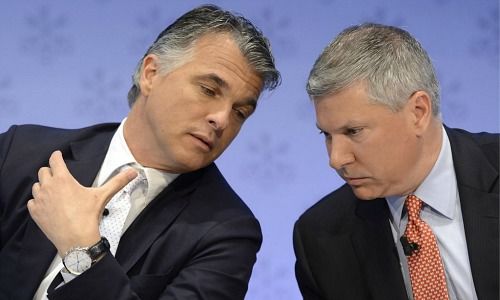Tom Naratil has been head of UBS in the Americas for just nine months. The former finance chief of the Swiss bank has disrupted brokerage rivals on key issues like pay, recruiting, and regional autonomy. The veteran UBS banker's excellent ties to Zurich set him up for more. Investors will get an initial read of his U.S. efforts by year-end.
Tom Naratil spent nearly five years in Zurich running UBS’ finance operations, two of them as Sergio Ermotti’s most trusted lieutenant and operating chief as well.
Still, the UBS «lifer» is barely known to a wider public, partly due to the behind-the-scenes nature of his job at the time.
That’s all changed since the beginning of this year, when the 55-year-old moved back to the U.S. to take over from Bob McCann.
Iconic McCann
McCann is am extremely well-connected brokerage industry heavyweight whose gravitas is the result of years at Merrill Lynch. He is credited with stabilizing crisis-hit UBS’ brokerage following a bailout in 2008.
McCann hit a $1 billion pretax profit goal in four years following years of tepid growth and rendered moot long-swirling questions over the former Paine Webber unit’s future.
He and Naratil are often described as two side of the same coin: the ultimate powerbroker McCann has always evoked strong loyalties from his broker workforce and his management team while Naratil, who joined Paine Webber in 1983, is a veteran of the back-room who is cooly analytical, extremely hard-working and energetic.
«Could End in Tears»
The handover was delicate: the resignation of McCann, who is now UBS’ chairman in the Americas and tends to key client relationships, had some brokerage experts predicting that Naratil's takeover could «end in tears».
In the first months of Naratil’s tenure in the U.S., he got a big break: UBS successfully hired 70 brokers in total off Credit Suisse following a unit sale to Wells Fargo.
In fact, so many defected that Credit Suisse lodged a complaint with industry overseer Finra, and Wells Fargo eventually conceded that the deal hadn’t fulfilled expectations.
Roboadvisor, Recruiting, Pay
This allowed Naratil to ease off hiring several months later, a move which means more money goes into keeping productive brokers at the bank, rather than plowing millions into the rapid-fire competition between wirehouses for the best brokers.
Naratil also stole a march on his far larger rivals by teaming up with SigFig, a San Francisco-based provider of roboadvisor software.
Rival Bofa Merrill Lynch said yesterday that it is setting up a roboadvisor by early next year.
To be sure, UBS is far outstripped by its larger rivals – Bofa Merrill, Wells Fargo, and Morgan Stanley – in financial firepower and in advisor count. Morgan Stanley has more than double the number of advisors as UBS, which has long said that it doesn't want to grow considerably beyond its current 7,100.
Sway in Zurich
Most recently, Naratil decided to upgrade the role of branch managers, who have been weighed down by a raft of regulation introduced since the financial crisis.
The executives now have a greater say in local marketing and pricing, for example, according to «The Wall Street Journal».
Perhaps most crucially, Naratil has close ties to and enormous sway in Zurich: remains a member of the overall bank’s top management and understands the minutiae of UBS’ profit-and-loss statements like no one else.
Zeltner Link
After all, he oversaw more than 2 billion Swiss francs of spending cuts at UBS following the bank’s 2012 dramatic scaling back of its investment bank in favor of private banking.
Although the U.S. unit has been managed independently of Zurich since UBS bought Paine Webber in 2000, Naratil quickly recognized that he could slash the U.S. unit’s spending faster by teaming up with the wider private bank, which is run by Juerg Zeltner.
Naratil is trying to shake up the traditional brokerage model’s exorbitant and complicated pay schemes and talent wars, says Alois Pirker, an analyst with Aite Group and former UBS banker.
Divulging Brokerage Secrets
He has also thrown down the gauntlet to the larger rivals, whose financial resources and workforce far outstrip UBS’, by revealing pay and recruiting plans for the year – traditionally closely-held management secrets.
«It may be that they have shown too much of their hand to rivals, who could well turn around and say they will keep going and thus undermine UBS, or they may agree and also dial back. We’ll see at the end of the year,» Pirker told finews.ch.

































